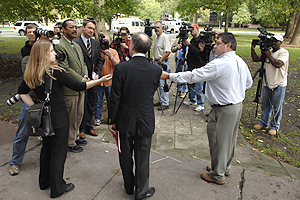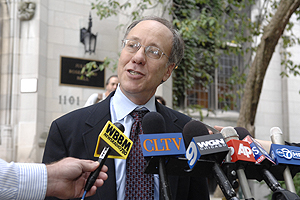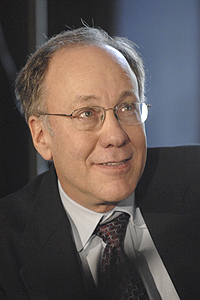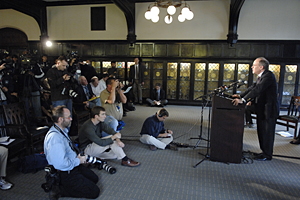Roger Myerson wins Nobel Memorial Prize in Economic Sciences for 2007
By William HarmsNews Office
 By 9 a.m. Monday, Oct. 15, Roger Myerson, the Glen A. Lloyd Distinguished Service Professor in Economics and the College (center in foreground), found himself surrounded by photographers and reporters from the Associated Press to WBEZ radio, after he learned he was one of three recipients of the 2007 Nobel Memorial Prize in Economic Sciences. He shares the prize with his colleagues Leonid Hurwicz and Eric Maskin.  Roger Myerson describes his research on mechanism design theory to members of the media.   Left to right, Nobel laureate James Heckman (2000), new Nobel recipient Roger Myerson (2007) and Nobel laureates Gary Becker (1992) and Robert Lucas Jr. (1995) take questions from reporters at a press conference in the McCormick Tribune Lounge in the Reynolds Club on Monday, Oct. 15. All four have won the Nobel Memorial Prize in Economic Sciences and are currently on the faculty at the University. Not pictured, but also an economics Nobel laureate and current member of the faculty, is Robert Fogel (1993).  Myerson describes his research on mechanism design theory at a press event, which members of the faculty and student body also attended to celebrate Myerson’s win. | |
Mechanism design theory is really all about communication, economist Roger Myerson explained on Monday, Oct. 15, at an impromptu press conference in front of Rosenwald Hall and later at a more formal event in the Reynolds Club, where he explained the work that led him to be named one of three winners of the 2007 Nobel Memorial Prize in Economic Sciences.
“Mechanism design is a basic theory that unifies many of the transactions we engage in,” Myerson told reporters. “If we are selling a house, the seller may withhold some information from the buyer, and there may be some information the buyer withholds. Mechanism design functions as a sort of mediator that can work to bring two parties into agreement.”
The theory also works in political situations, when countries in disagreement do not share all the information at their disposal, and when competing political campaigns cannot know all the details about each other’s strategies, he said.
Myerson was recognized for his contributions to mechanism design theory, initiated by co-winner Leonid Hurwicz of the University of Minnesota, and which Myerson further developed with Eric Maskin of the Institute for Advanced Study, who also shares the prize. Hurwicz was a member of the Cowles Commission from 1950 to 1955 when it was based at Chicago.
Mechanism design theory allows for people to distinguish between situations in which markets work well from those in which they do not. It has helped economists identify efficient trading mechanisms, regulation schemes and voting procedures. Today, mechanism design theory plays a central role in many areas of economics and parts of political science.
“The theory of mechanism design seeks to understand how resources can be allocated in socially effective ways, even when the information needed to perform the task is spread among many individuals,” said Philip Reny, Chair of Economics.
“An effective mechanism provides those individuals with incentives to reveal their information truthfully, so that the desired allocation can be implemented. Roger Myerson made a path-breaking contribution to the theory of mechanism design when he discovered a fundamental connection between the allocation to be implemented and the monetary transfers needed to induce informed agents to reveal their information truthfully.
“Myerson’s fundamental theorem, now called the ‘revenue equivalence theorem,’ forms a crucial part of a vast literature on mechanism design and is used especially heavily in the design of auctions. It is now impossible to work in the field of mechanism design without a thorough understanding of Myerson’s result,” he added.
Myerson, the Glen A. Lloyd Distinguished Service Professor in Economics and the College, has made seminal contributions to both economics and political science. In game theory he introduced a refinement of Nash’s equilibrium concept, called “proper equilibrium.” He has applied game theoretic tools to political science to study and compare electoral systems, and he also developed fundamental ideas of mechanism design, such as the “revelation principle” and the “revenue-equivalence theorem.”
Myerson also has developed computer software for auditing formulas and for simulation and decision analysis for use with Microsoft spreadsheet software.
He is the author of Game Theory: Analysis of Conflict (1991) and Probability Models for Economic Decisions (2005). Myerson also has published numerous articles in Econometrica, Mathematics of Operations Research and the International Journal of Game Theory, for which he served as an editorial board member for 10 years.
During his 25-year tenure at Northwestern University, Myerson twice served as a Visiting Professor in Economics at Chicago. He joined the Chicago faculty in 2001. He received his A.B., summa cum laude, and S.M. in applied mathematics in 1973 from Harvard University and a Ph.D., also in applied mathematics, from Harvard University in 1976.
![[Chronicle]](/images/sidebar_header_oct06.gif)